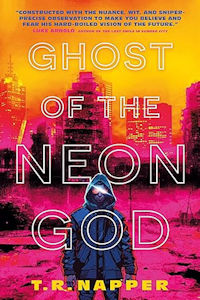Paul Di Filippo Reviews Ghost of the Neon God by T.R. Napper
 Ghost of the Neon God, T. R. Napper (Titan 978-1803368115, hardcover, 128pp, $17.99) June 2024
Ghost of the Neon God, T. R. Napper (Titan 978-1803368115, hardcover, 128pp, $17.99) June 2024
This year marks the fortieth anniversary of the publication of William Gibson’s Neuromancer, and, arguably, 1984 can serve as the birthday of the cyberpunk genre as well or better than any adjacent year. I think at this point, we can cease debating about the nature of cyberpunk, its utility and whether it’s here to stay. We all recognize it when we see it; its tropes conform to our 2024 reality and provide legitimate speculative fodder; and it’s still being produced. A potent case in point is the appearance of Jared Shurin’s The Big Book of Cyberpunk some nine months ago. (I’m privileged to have one-and-a-half stories therein.). Any mode of fiction that can rack up a table of contents like that anthology has legs.
And T. R. Napper’s latest novel—his third (or fourth if you count one for the Alien franchise), and the first I’ve read—gloriously upholds the c-p legacy. It’s not an exercise in 80’s nostalgia, nor a cut-and-paste assemblage of cyber-tropes, but rather a fresh re-envisioning of what the first generation of writers saw and tried to forecast and report.
A native Australian, Napper sets his tale in Melbourne and vicinity, lending it some different texture, as opposed to all those tales set in Europe, the USA or the Far East.
We open on two petty thieves, Jack Nguyen and Col Charles. Jack is not dumb, but more fluent in emotions and street smarts, while Col is a bit of an educated philosopher. Both men have the standard neural-link hardware which all citizens possess. Their Mutt and Jeff bonding is heartening to see, and Napper makes their connection—part survival-oriented, part real friendship—feel real, right from the start.
Out one night to earn some cash by any means, they stumble (literally) upon a rich Chinese woman who is being chased. She claims to be on a world-changing mission. Refusing to help, and in fact stealing her designer shoes, the pair leave her behind to her fate, and forget about her. But the people doing the chasing have other plans.
To reveal the McGuffin that will become the engine of the story, a fact which Jack only comes to realize gradually, the woman, while making physical contact with Jack, has uploaded something to Jack’s neural nexus. It proves to be the world’s most perfect Artificial Intelligence, which chooses to call itself Oondiri. And now Jack is Oondiri’s vehicle as the AI searches for escape and permanent freedom.
When Jack and Col become separated, Jack decides to leave the city by negotiating an anonymous ride-share. His innocent companion proves to be a student named Sally Redacre, trying to get home after her semester is done. But a short time after hooking up, Sally becomes Public Enemy Number Three (after Oondiri and Jack) and is fighting for her life.
The roster of officials and cops and assassins—especially one scary stone-faced guy named Hank Quinlan—who come after the pair proves to be thick and inventive, and Jack and Sally barrel from one chase and cliffhanger to another. This part of the book is extremely cinematic and pulse-pounding, and in fact one can envision the whole novel transformed into a miniseries like Gibson’s The Peripheral.
Napper walks a delicate tightrope when limning the emotional bonds between Jack and Sally. At first, she hates him, while he finds her a pampered creature of privilege. But their shared discomfort and perils gradually transform their feelings. They never become cliched lovers, but experience something more complex, akin to respect and empathy and admiration.
The ending will whipsaw the reader through failure and despair to unforeseeable triumph. I never saw it coming.
Napper’s prose is not as gorgeous as Gibson’s, but it does carry a kind of stoic poetry resonating with Jack’s character.
At the edge of the Nullarbor Plain, they’d stopped to recharge Sally’s red Tesla Ganymede at a battery station, field of panels behind, glinting in the sunlight. Sally had gone to the bathroom and left him in blessed silence. When he’d stepped out into the open air, an immense quiet had weighed down on him. Nothing, but the tic-tic-tic of the charger, and the sigh of the car on baking asphalt.
By tale’s closure, we realize that we have been experiencing a meditation on heroism and responsibility and transcending one’s sociological class.
The being opened its eyes. When you do that, when you first wake up in the morning, you can forget who you are and where you are. At that moment, the world is full of limitless possibilities. That space between opening your eyes, and your feet touching the floor, contains a universe. Then your feet touch the ground and the world comes rushing in. All you can be is who you are, a destiny, foretold. All you can become are the mean inevitabilities given by the world. And yes: all you can be is the culmination of the choices you have made, accreted and accreted over time until their weight becomes crushing. Until the weight of all your mistakes suffocates your life.
It’s not just the existential human condition, it’s the silicon sentient condition too.
 While you are here, please take a moment to support Locus with a one-time or recurring donation. We rely on reader donations to keep the magazine and site going, and would like to keep the site paywall free, but WE NEED YOUR FINANCIAL SUPPORT to continue quality coverage of the science fiction and fantasy field.
While you are here, please take a moment to support Locus with a one-time or recurring donation. We rely on reader donations to keep the magazine and site going, and would like to keep the site paywall free, but WE NEED YOUR FINANCIAL SUPPORT to continue quality coverage of the science fiction and fantasy field.
©Locus Magazine. Copyrighted material may not be republished without permission of LSFF.






